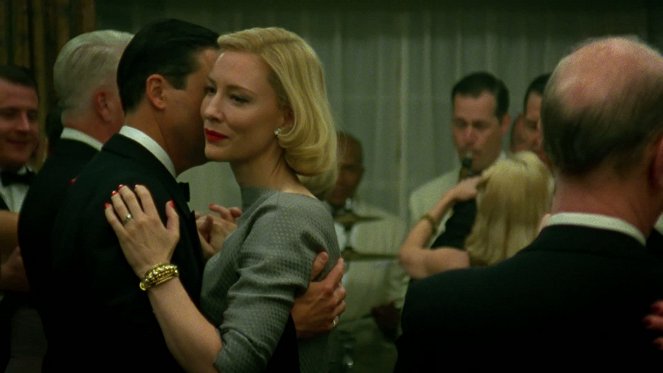Rendező:
Todd HaynesForgatókönyvíró:
Phyllis NagyOperatőr:
Edward LachmanZeneszerző:
Carter BurwellSzereplők:
Cate Blanchett, Rooney Mara, Kyle Chandler, Jake Lacy, Sarah Paulson, Cory Michael Smith, Carrie Brownstein, John Magaro, Ken Strunk (több)Tartalmak(1)
Az ötvenes évek gazdasági fellendülése idején a húszas éveiben járó Therese (Rooney Mara) Manhattan egyik nagyáruházában dolgozik eladóként, és naphosszat a jobb életről, és a szerelemről álmodozik. Egy nap találkozik a jómódú Carollal (Cate Blanchett), aki kihűlt házasságában vergődik, és amit talán csak kislánya iránti imádata tart egyben. A két nő között rögtön szikrázni kezd a levegő, és kezdetben ártatlannak induló találkozásuk az érzelmek hatására gyorsan elmélyül. Carol féltékeny és továbbra is szerelmes férje (Kyle Chandler) meg akarja kérdőjelezni a nő anyai rátermettségét, valamint erkölcsösségét. Később pedig további, mélyre elásott titok is felszínre kerül a múltból. (Vertigo Média)
(több)Videók (25)
Recenziók (6)
Gyönyörű operatőri munka és zene. De a központi páros története lélektanilag és szexuálisan is iszonyatosan UNALMAS. Mintha a naplementét a tökéletesen megcsiszolt műanyagon keresztül nézném. A Reprezentációs ház (a filmfesztivál megnyitója) őrületes fapadjain ülve kész szenvedés volt.
()
Carol is a movie that’s based solely on the acting performances of Cate Blanchett and Rooney Mara. They both act exactly the way they need to. Cate is beautiful, dominant and exactly knows what she wants. Rooney is beautiful, quiet and her there’s a battle going on in her heart. But if it weren’t for one faint mention of the Czech Republic, there wouldn’t really be any significant reason for me to listen to the dialogues.
()
In terms of style, Carol is perhaps Todd Haynes’s "straightest" film. Far From Heaven was rather more a meta-commentary on Douglas Sirk’s melodramas than a pure, absorbing and universal love story. In my opinion, Carol is a mature work by a director with a sense of humility toward both the story the and actresses depicting who doesn’t need to prove anything to himself or the audience (yes, I’m looking at you, Alejandro). With its purifying simplicity, behind which you feel the long consideration put into every shot, it reminded me of Lean’s Brief Encounter. In Carol, we also begin with one of the last scenes (which we see from a completely different perspective at the end), the points of view of the two lovers are also taken into equal consideration and their love is of the forbidden, socially unacceptable kind. However, the protagonists have to hide their emotions even more cautiously than the lovers in Lean’s film. Their relationship is perceived as obscene not only morally, but also legally, which enriches the narrative with the elements of a crime story. Therese and Carol must limit their interactions to fleeting touches, timid glances into each other’s eyes and outwardly innocent conversation. Their position in the shot, the settings in which they find themselves, the objects that complement them (or prevent us from seeing them better) often reveal more to us. This is probably why many find the film academically cold and detached. I would rather choose the words “subtle” and “restrained” – the film is not built on grand emotions and contrived plot twists, but on the small gestures and glances through which Carol and Therese communicate with each other, for lack of any other vocabulary, to the point where they can no longer return to their previous identities and no longer pretend to be someone else. Thanks to what is felt but not expressed, the film does not lack a dramatic or erotic tension, which would be unattainable with greater explicitness. In the search for relationship balance, Haynes meaningfully combines several minor motifs (the car ride, a symbol of the protagonists’ enclosed microcosm and their unfulfilled desire for freedom, security and gaining power over perspective and representation through photography) and supporting characters, not one of which ultimately gives Carol and Therese an excuse to verbalise their feelings. Like The Duke of Burgundy, Carol is not only about a lesbian relationship. Probably everyone who has ever been in love has experienced the same uncertainty about how to express feelings for which they don’t have words. 85%
()
This film about hidden feelings peculiarly chooses an aesthetic based on a precise yet tottering outward exterior. However, the seemingly mediocre and stiff shots are agitated to the point of resembling the work of Wong Kar-wai, offering us a rare and fragile glimpse into the characters’ inner selves as they let their minds dreamily drift to where they want to be despite their noisy surroundings. It’s too easy to dismiss Carol as just another standard romantic film about love against all odds. Todd Haynes and his collaborators created a flawless depiction of the lacerating tension that arises when the characters cannot express their feelings, mainly because of the period and its prejudices, but also simply because of their surroundings, the direction of their lives and their own caution and fears. Carol thus becomes a romantic drama built on reserved appearances and masks, which the film presents to viewers just as the characters present them to each other. Behind every seemingly indifferent gaze there is a silent longing and a troubling uncertainty, which is all the more powerful when its broken by fleeting glances and touches. Because of that, the dramaturgy plays an essential role in the narrative, as it emphasises the duration of those key moments when the couple can share a moment together in that hostile world.
()
Strong acting, masterfully directed and written, but for me it falls into the category of predictable queer drama with everything that it encompasses, including very stenciled emotions. A model American melodrama that deservedly receives acting awards, but at the same time a film that ends only with realization bravado. Cold, forgetful, over-cultivated - at least that's how it felt to me during this year's Cannes competition.
()
Galéria (142)
Photo © The Weinstein Company / Wilson Webb



Hirdetés